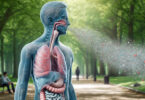By Mary West
Guest Writer for Wake Up World
New parents who have a dog or cat may have concerns about the prospect of having a pet in the house when the baby arrives, being worried about exposing the child to dirt and germs. However, a study published in Pediatrics puts these fears to rest, finding that babies who spend time around pets, especially dogs, have a lower incidence of ear infections and respiratory disorders than those whose homes are pet-free.
Researchers in Finland tracked 397 babies from before birth to one year of age, questioning parents weekly about the child’s health and contact with dogs or cats. They found that babies with early contact with pets were noticeably healthier, having a 30 percent lower incidence of ear infections and respiratory infection symptoms, such as coughs, stuffiness and runny nose, as well as sneezing and congestion.
Owning a cat was somewhat protective, but the effect was much stronger with dogs. Babies born in homes with dogs had a 44 percent lower incidence of developing the common childhood ailment of ear infections. Additionally, they had a 29 percent less likelihood of having used antibiotics in the past year than kids without pets. The most substantial protective effect was found in homes where the dog stayed inside six hours or less, as opposed to being inside all day, which indicates that what canines track into the house, may factor into the equation.
The findings led researchers to the conclusion that early contact of infants with dogs helps develop their immune system, enabling them to fight infections better. Lead author, Eija Bergroth, says the results support the premise that animal contact is important in the first year of life, possibly boosting resistance to infectious respiratory disease during childhood.
What causes this protective effect?
The authors postulate it may be due to the fact the households with dogs tend to spend more time outdoors. Another theory is that the dirt and bacteria dogs track in may stimulate a child’s immunity, helping it to mature.
The health protective effects of having a dog are not confined to infections. Other studies reveal that early animal exposure also reduces the risk of allergies.
In spite of these benefits, parents of babies and toddlers should exercise care to ensure safety. As babies explore, they should be shown how to approach a dog in the right manner. In addition, children should be taught not to disturb a dog that is eating or sleeping, and they should be admonished not to approach an unfamiliar dog.
So dog owners can rest assured knowing it is not necessary to give up a cherished pet when babies arrive on the scene. The beloved furry creature that adds so much to family life can help keep your child healthy.
Article Sources:
http://blogs.webmd.com/childrens-health/2012/07/dogs-can-be-babys-best-friend-too.html
About the Author
Mary West is a contributor to the natural wellness site, Live in the Now. She is a natural health enthusiast as she believes this area can profoundly enhance wellness. She is the creator of a natural healing website where she focuses on solutions to health problems that work without side effects. You can visit her site and learn more at www.alternativemedicinetruth.com. Ms. West is also the author of Fight Cancer Through Powerful Natural Strategies.

If you've found value in our articles, we invite you to support the release of our brand-new book, "Gratitude Practices for Kids: A Practical Guide for Adults to Instill a Spirit of Appreciation and Positivity in the Next Generation."
"Gratitude Practices for Kids" brings together over 25 innovative and accessible practices designed to enhance gratitude in everyday life. This comprehensive guide is backed by 17 scientific studies, ensuring each concept is grounded in research, underscoring our commitment to nurturing growth, emotional intelligence, and positive interactions between adults and children.
We encourage you to opt for the paperback version to celebrate this new release. Dive into its fresh pages away from digital distractions, allowing you to immerse yourself in the transformative practices it offers.
Over recent years, Wake Up World has faced significant online censorship, which has impacted our financial ability to operate. Moving into book publishing represents a strategic step to secure the ongoing funds needed to continue our mission. By purchasing Gratitude for Kids, you help us keep our content free and accessible to everyone, avoiding needing a paywall. With over 8,500 articles published in the last 13 years, we remain dedicated to keeping our valuable content open to all.
Disclaimer: This article is not intended to provide medical advice, diagnosis or treatment. Views expressed here do not necessarily reflect those of Wake Up World or its staff.








